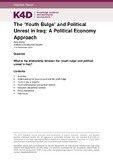| dc.contributor.author | Amirali, Asha | |
| dc.coverage.spatial | Iraq | en |
| dc.date.accessioned | 2019-12-06T11:22:37Z | |
| dc.date.available | 2019-12-06T11:22:37Z | |
| dc.date.issued | 2019-11-11 | |
| dc.identifier.citation | Amirali, A. (2019), The ‘Youth Bulge’ and Political Unrest in Iraq: A Political Economy Approach, K4D Helpdesk Report. Brighton, UK: Institute of Development Studies. | en |
| dc.identifier.uri | https://opendocs.ids.ac.uk/opendocs/handle/20.500.12413/14815 | |
| dc.description.abstract | This report reviews existing research on the relationship between the ‘youth bulge’ and political unrest in order to understand when and why young Iraqis resort to violence or disruption. There is some disagreement in the literature about whether youth bulges can be said to cause political violence and disruption or not. Some studies posit a simple causal relationship. Others argue – more convincingly – that neither demographic nor economic factors alone are enough to incite violence. The latter perspective maintains that the effects of protracted conflict and the specific nature of the country’s political economy significantly shape young people’s strategies for subsistence and social status. In Iraq, widespread youth unemployment combines with high levels of political exclusion, sectarian politics, militarization, perceptions of injustice, frustrated aspirations, war-related trauma, and the rapid breakdown and transformation of traditional institutions such as family and tribe. Together, these factors (and others not covered in this review) produce violence in specific moments. A systematic study of how Iraq’s youth ‘bulge’ affects the country’s political dynamics is warranted. There is little academic work on youth behaviour in Iraq but development organizations have conducted relevant small-scale studies in recent years. While these studies are locality and time-specific, they are an important source of information for this report. The academic literature is mined for cross-national analysis as well as comparative cases. The cross-national analyses are quantitative and their findings should be treated with the caution appropriate to all studies that do not account closely for contextual variation and those things which cannot be put in numbers. | en |
| dc.language.iso | en | en |
| dc.publisher | IDS | en |
| dc.relation.ispartofseries | K4D Helpdesk Report;687 | |
| dc.rights.uri | https://www.nationalarchives.gov.uk/doc/open-government-licence/version/3/ | en |
| dc.subject | Children and Youth | en |
| dc.subject | Participation | en |
| dc.subject | Politics and Power | en |
| dc.title | The ‘Youth Bulge’ and Political Unrest in Iraq: A Political Economy Approach | en |
| dc.type | Helpdesk | en |
| dc.rights.holder | © DFID - Crown copyright 2019 | en |
| dcterms.dateAccepted | 2019-11-11 | |
| rioxxterms.funder | Department for International Development, UK Government | en |
| rioxxterms.identifier.project | K4D | en |
| rioxxterms.version | VoR | en |
| rioxxterms.funder.project | 238a9fa4-fe4a-4380-996b-995f33607ba0 | en |

